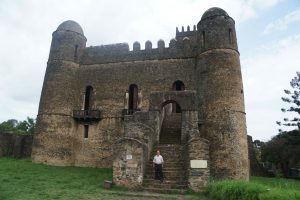
A day amid castles
Those of you who have joined Fred’s expeditions to places like Ticonderoga and Fort Niagara and Castillo de San Marcos can only imagine the joy—nay, ecstasy—I experienced when I toured Gondar today. A city of half a million people, it was the third capital of Ethiopia (1632-late 18th century), and illuminates a number of historical themes: wars against Muslims (including the Mahdi in the 1880s) as well as world war II (it was an Italian base, and parts of the historic city were destroyed by British bombers in 1941), as well as the capital of Amhara. Because the last dynasty started here, Amharic is the official language (there are 83 recognized languages in Ethiopia, though my guide assured me that English is the “second language” and one being taught starting in kindergarten).
The first emperor to settle in Gondar, Fasidilas, ruled from 1632 until 1677, and set the stage for the grandeur of the city—the palace compound. Occupying 7000 square meters, the compound houses six palaces, a stable, a banquet hall, an archive (torched by the Mahdi, bombed again by the British since the Italian army used part of the palace grounds for a military encampment), a lion cage (the royal families, whoever they have been, claimed descent from the Solomon-Sheba assignation, and claimed as well to be descendants of the lion of Judah; there were lions kept in the cages until 1990), and two Turkish baths. Most of the existing artifacts are in a museum which is—alas—under construction, so I can only imagine the splendor that once was Gondar.
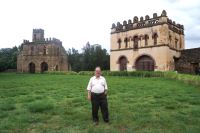 The buildings themselves ought to be somewhere in Europe, guarded by knights in shining armor. I told my guide to be on the alert for damsels in distress—then had to explain what damsels in distress were, and why as a knight, he was bound to be chivalrous, then I had to explain what a knight was, so I kept the medieval dream to myself—but that’s how European the castle/palace looked.
The buildings themselves ought to be somewhere in Europe, guarded by knights in shining armor. I told my guide to be on the alert for damsels in distress—then had to explain what damsels in distress were, and why as a knight, he was bound to be chivalrous, then I had to explain what a knight was, so I kept the medieval dream to myself—but that’s how European the castle/palace looked.
Fasilidas took over from his father, who had invited the Portuguese and other Europeans to help turn back the Muslim invaders; the Portuguese apparently decided they did not want to be allies, but wanted to take over the country, and converted dad to Roman Catholicism (the things you can 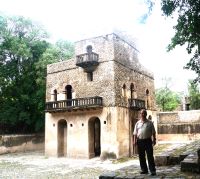 learn about Europe in Africa!). Fasilidas apparently threw out the Portuguese and steadied the Orthodox ship of state. He built an imperial swimming pool that is 50 meters by 30 meters and 2.5 meters deep for rebaptizing converts; the pool is used once a year for a baptism ceremony (sometime in January) when 40,000 people frolic in the pool. The bathhouse is fit for a king, as indeed, it literally was. It also has banyan trees on one wall—the trees whose roots fill in cracks….
learn about Europe in Africa!). Fasilidas apparently threw out the Portuguese and steadied the Orthodox ship of state. He built an imperial swimming pool that is 50 meters by 30 meters and 2.5 meters deep for rebaptizing converts; the pool is used once a year for a baptism ceremony (sometime in January) when 40,000 people frolic in the pool. The bathhouse is fit for a king, as indeed, it literally was. It also has banyan trees on one wall—the trees whose roots fill in cracks….
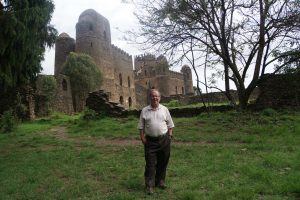
Each of the six Gondar kings built a palace, but none rivaled that of Fasidilas. The architecture borrowed from Europe—and elsewhere. Pediments (I think that’s the word) above the doors have a Star of David (the Solomonic dynasty heritage—plus the Ethiopian Jews who emigrated to Israel in the 1970s—50,000 I believe–lived in a small town near here), Moorish designs, Ottoman designs, and even the evicted Portuguese are featured. When it come up for sale……see what I put on Facebook and you’ll know why I particularly enjoyed today, a national holiday in Ethiopia commemorating the end of the Derg in 1991, the communists who ended the Solomonic line.
Speaking of royalty, my hotel sits on a hill above the city –at 7300 feet–where I can look down on the Castle. Like the one in Aksum, it was built under the aegis of Emperor Haile Selassie; therefore, it must be fit for royal guests (like me).
Driving through Gondar, another unfinished town, which I think of as early 1990s China—with similar shops in similar buildings, where donkeys and 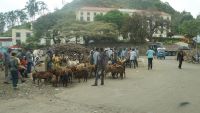 cows and goats and people and “blue donkeys”—the tuktuks name here—share the semi finished street with cars and trucks—I saw the “animal” market, where you can buy and sell sheep and goats and…And I thought, “I’ve never bought an animal and brought one home. What a souvenir!” I sheepishly considered it, but, even though goated to reconsider, chickened out, happily. I’ll take home, instead, wonderful memories of a 17th century castle in northern Ethiopia.
cows and goats and people and “blue donkeys”—the tuktuks name here—share the semi finished street with cars and trucks—I saw the “animal” market, where you can buy and sell sheep and goats and…And I thought, “I’ve never bought an animal and brought one home. What a souvenir!” I sheepishly considered it, but, even though goated to reconsider, chickened out, happily. I’ll take home, instead, wonderful memories of a 17th century castle in northern Ethiopia.